When I was a boy, I put a lot of attention into getting my parents out of the house. I did this so that I could play games on the desktops that we had at home- the desktop computers, so I could play games that they did not want me to play. Among these games was a role-playing game that I discovered at one of my friend’s houses. In this game, there were other characters. And you could play as a character like, like all video games, really, however, this one had a lot of conversations. And moreover, you could customize your main character, you could have different jobs, called classes, different professions and skills, different ways of relating to the world.
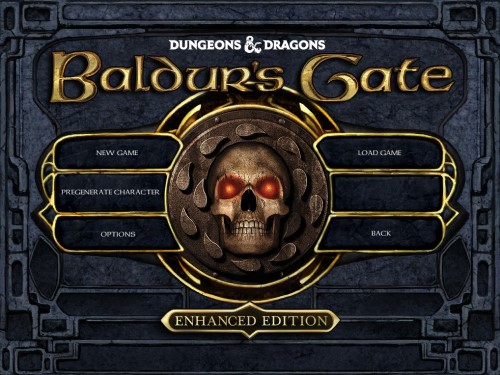
The game was Baldur's Gate. I did not know this at the time, but it was based on the Dungeons and Dragons tabletop role-playing game system. Later in life, it would lead me to play more Dungeons and Dragons, to the extent that those worlds and that way of relating to the world is fundamental to my being. Even now I have mental names for a lot of the people who are closest to me in life. And those names vaguely follow the pattern of what you might call a Dungeons and Dragons class. Say, in D&D, you have the classes mage, rogue, fighter, or cleric. You might also have something called a Dawn Cleric, or a Duelist, and so on. Accordingly, I might have a friend that I called a Red Mage, which is actually a nod to Final Fantasy as well. Or I might call them a Starbucks Latte Mage in my mind, if that friend happens to also be someone I associate with Starbucks lattes. Though at this moment, thankfully, for the people around me, I don't think I know anyone whose essence of being seems to be wrapped up in Starbucks lattes.
The point is, this was a rich world, in comparison to say Age of Empires, which had factions. But these factions barely had personalities. Or Doom, which was similar in that there were many demons that you killed. But we didn't really know much about who you, as the main character, were. Role-playing games introduced me to the idea that you could use games to explore parts of who you are. As a child, I did not know this. I'm only looking back now and assigning this meaning to it. But it does seem clear that this was the appeal of Baldur's Gate. It was the first game I'd encountered that was rich with meaning, that was rich with plot, that was rich with the political interaction between characters that I knew very well from my life in an Asian church community.
You see, that community being as insular as it was, while it went out into the world and interacted with the world, it definitely had a sense of Us vs. Them built in. This is because we were Seventh-Day Adventists in a Muslim country. And some of the Adventists already sort of have a chip on their shoulder, that I think is probably similar to Jehovah's Witness, or Mormons, in the sense that they are self-professed Christians that are not wholly accepted as such by other Christians. Going to church on Saturday and observing the Sabbath and having diet restrictions definitely confers a sort of strangeness on them. And this combined with the Asian predilection for collectivism led to a very strong and tight-knit community. The kind that you tend to see a lot I think, in soap operas. As in, there's always a lot happening. Someone is always upset that they did not get to lead choir last week, or that in the last potluck, so and so only brought pasta. And then she did not bring her special salad that everyone likes, because she was pissed off at the youth pastor for playing too much soccer, who likes that salad. You might be familiar with the tropes.
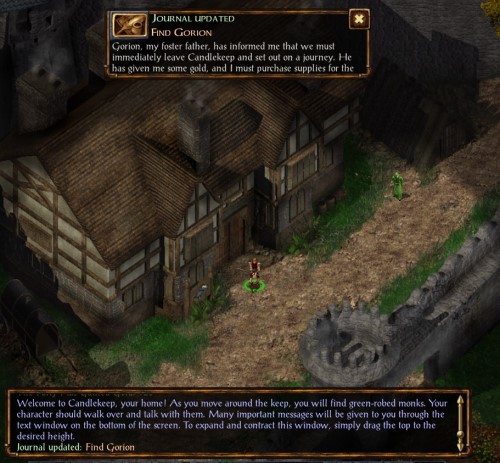
Living in this environment, I didn't get to see as much of that in a lot of the games that I was playing. I did get to see it in Baldur's Gate. For the longest time, I thought this was a means of escape. That I was trying desperately to ignore the world around me in favor of the world of Faerun, the world of the Forgotten Realms where, in the opening scenes of the game, you find that you are in a small idyllic library town, raised by scholars, without parents of your own. Well, someone very powerful and dominant has come to destroy your home, all because of you. Because they want to destroy you. And you don't know why they want to destroy you. But the fact that they do suggests that there's something exciting going on, that there's something momentous, that the world is a wild and dangerous world full of mystery. And you never know when it's going to just reach out and change your entire world. Because you are a part of it after all.
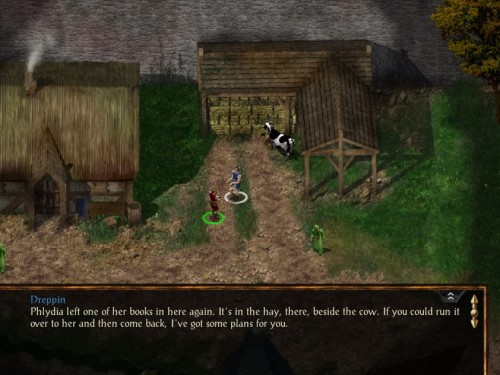
So you might see the appeal to someone living in a peaceful, idyllic island community where your parents are recognized, just about everywhere you go, where you are recognized as their son, where you live in a community of scholars and medical professionals. How it might be appealing to explore what it's like to have that kind of world upended. Because just like Gorion, who is your foster parent in the game of Baldur's Gate, just like Gorion tried to protect the ward, the main character, in Baldur's Gate from learning about the truth about the world- in my world, I was prevented from doing things like playing Baldur's Gate or reading Harry Potter, or learning about what sex was. And yet, this world full of things that were seemingly hidden from me was reaching out and grabbing me every day. So much so that I would secretly listen to the radio on my tape player while pretending to listen to tapes, because that was how the wider world was reaching me- through the radio. Through the references my friends made to movies that I was not allowed to watch. Through TV shows that I was not allowed to watch, through entire theories and ways of being that I was not allowed to study, such as Darwin's Origin of Species.

There were ways this game hit me that a lot of other media did not. Most of the media I consumed had to do with Christianity. And I appreciated the Old Testament more than most. Maybe there was something true about the polytheism that was in the background there. True because I lived in a polytheistic society, even if it was dominated by monotheists, even if Malaysia was mostly Muslim, even if every influential member of my community was Christian, there is a polytheistic edge to the people there that is not as present in the people in the United States. You see, when they told ghost stories, when they spoke of demon possession, they believed it much more often. And this belief changes the way that you view the world.
In the West, Buddhism is seen as somehow different from other religions. As more respectable, because it's more compatible with some of the dominant narratives in our society. Namely atheism, rationalism, empiricism, and so on. But in Asia, I can tell you that Buddhism has plenty of worship of little gods and little spirits and big gods and big spirits. Now, you do worship your ancestors. They do light the incense, they do leave food out for them, and you do pray to them. This history was all around me. Even if it wasn't written about, it was in the behavior of everyone around me. My parents , who are monotheists, had some of the fears and respect that one would expect from an animist or a polytheist. And this is not an accident. After all, it's only one generation. My grandparents were Hindus. My grandfather was something of a bomoh- a shaman, a witch doctor. He conducted animal sacrifice, he spoke to spirits. Some of my aunts and uncles were negatively impacted by this. That's part of what drove them to Christianity, though their belief in the spirits and demons and so on, was very, very real. And so you have polytheism in everyday monotheistic life.
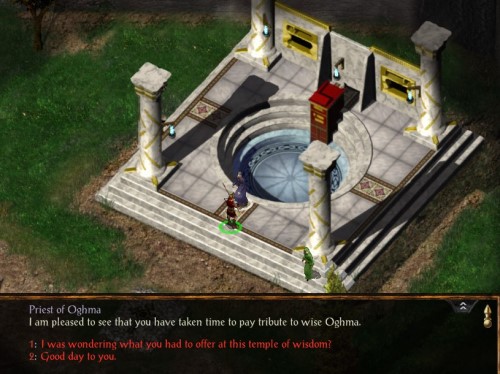
This quiet fact is not really acknowledged in most media. And it was not acknowledged in most media I consumed until I played Baldur's Gate. In all of the bumbling attempts by Gary Gygax and his ilk, they did figure something out. They did figure out what polytheism would be like, in their worlds, they did seem to happen upon something that does ring a little true. The way the gods are treated in Baldur's Gate seemed familiar to me. You do look warily at a tree, as you're passing it, if it is associated with an old spirit. You do refrain from saying its name. You do pray to multiple gods, in an attempt to have all your bases covered, in polytheism.
The Romans were famous for claiming that the gods of the people they would conquer were on their side. And they often did this by giving those Gods lots of sacrifices and doing rituals in their name, and so on. That is a powerful thing, if you can convince the people you're about to conquer that their gods are on your side. It says a lot more about respecting local tradition than insisting that the local way of being is completely invalid, and does not exist. As is often the case with Christian missionaries. The Whitman family, a family of missionaries, got massacred. I mentioned them because that happened only a few hours from where I am now. And whenever I read accounts of it, it seems natural to me. If you come into this world, and insist on Original Sin, maybe that is an attack. If you insist that we are all guilty, and we need forgiveness, maybe that is an attack. Maybe that is an attack that demands a response. So Baldur's Gate presented a world that had more in common with the world I knew than a lot of the other games that I was exposed to or playing at the time. It also contained consequences in terms of how you dealt with each of your party members. In Baldur’s Gate 2: Shadows of Amn, they even introduced the chance to romance some of the other characters in the game. And if you got too close with one character, say Viconia DeVir, the evil Dark Elf cleric, you might piss off one of the other potential romance interests, which includes the mentor figure, Jaheira, the Harper agent who is on the side of balance. Or the Good wizard, Aerie, who is a sort of innocent, almost fairy character, kind of a catgirl, except she's a bird girl. I mean, not really a bird girl. She's a winged elf, but there's definitely something of a 21st-century snowflake to her. The point is that if you went too far down the road with any of these characters, you might alienate the others. They might not like it, they might leave. This is not something a lot of other games at the time had as a feature. The first time I played through Baldur’s Gate 2, it took me something like 300 hours, over many years and transferred saved game files.
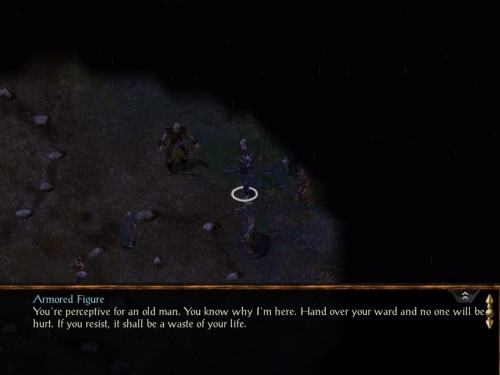
I'm reminded, in thinking about this, of a few articles by OpenAI, on the role of self-play in learning. They indicated that to train the AI, it was useful to put that AI in an environment where the AI was allowed to play with itself, by pretending to be different agents playing hide and seek, and other games. And from this activity, from being given an environment with constraints, in this case, a simulation of physical constraints, the AI was able to come up with the use of tools on its own, without specifically being trained to come up with tools by the researchers. And it's easy to see, or at least it's easy for me to see, how games in our lives serve a similar purpose.
I've had a PC available to me at least since I was six years old. 1995. That's a long time gaming. About four- a little more than four years ago, I stopped gaming. The last game I played on the PC in earnest was The Witcher 3. And before that, there were many multiplayer games, between The Witcher 3 and Baldur's Gate, Baldur's Gate being the first game that really wholly captured my mind. There were other games before it. Jack the Jackrabbit, Electro-Man, many other games whose names I forget- the Ninja Turtles Gameboy game, so on and so forth. But Baldur’s Gate was the first that really captured my imagination. Apparently the last game that did that, for me, was the Witcher 3. Even though there was a long time period, between the time I was about 13, and maybe a year before the Witcher 3, where most of the time, if I was playing something, it was a multiplayer competitive game- such as Counter-Strike , or Half-Life: Deathmatch before that. And many, many hours spent in Mount&Blade: Warband. Despite all this heavy experience with player versus player games, the last game that captured my attention, and the first game that seemed to have captured my attention, were kind of the same in what they were. They were single-player role-playing games with very well-developed worlds for the times that they were developed in. So it's nice to have that circle for my gaming career. I did not decide to quit playing PC games, it sort of just happened.
Looking back, it appears to me that the thing that I was looking for in games was a training ground, in the same way that the AI needed an environment with constraints to test itself, and to develop problem-solving ability that could then be used for other things. I used games as a training ground. I did not know this at the time, but I did find myself, increasingly, looking for a game that was more complex, more rich than the last game- until one day, one day it became clear that the game I was looking for was the game of life. And yet now it is not that I don't game. I do play many games, they just tend to be more embodied. I remember when I was playing Star Wars: The Old Republic MMORPG when it first came out, I picked a playstyle that involves clicking on sixteen different buttons, when I could have picked a playstyle that would only involve clicking on, say, six or eight buttons. And before that, in many other games, I would do a similar thing, making the game harder, making it more tied to my actions. When I played a player versus player, multi-user dimension game, a game that is based on text that has a very rich political world in it, but one nonetheless based on combat simulated by sentences- when I played that game, most of the combat was handled by bots, by programs people would write to handle that aspect of the game. When I played that game, I enjoyed turning the bots off on occasion, and going in manually. This was an attempt, I think, to put more skin in the game, to have more points of contact with the interaction that was happening. So it makes sense to me that eventually, no digital game seemed to provide this.
ARMA 3, when it came out, was really good about adding more firing positions than say, Counter-Strike. These are both first-person shooters designed to simulate firefights. One is on the more gaming end or the more typical gaming end, like Counter Strike, you have points for health and randomized hitboxes and such. And your body in the game is not very articulate. You're kind of just always facing the same direction as you're moving around. And you can't really kneel. You can crouch or squat. But that's about it. You can't go prone. You can't roll around on the ground. But you can crouch and you can jump straight up. And that was it. In ARMA 3, by contrast, you had all the major firing positions that infantrymen use. So , seated, crouched, kneeling, high prone, low prone, so on. But even ARMA, with its physics engine for simulating bullet drop, so that a lot of the principles that you use when finding targets with your weapon are kind of similar to the ones that you'd use in real life, even ARMA was not quite enough.
At the end of the day, a game is not going to reward you for putting your right hip up on a rock in a certain way, or your left ankle down in the dirt another way- all the richness that you get from interacting with the environment. And the major benefit in a conflict does often come from the environment. That's why knowing your terrain is so important. Knowing what cover and concealment is available, knowing what the high ground is. All these points of contact with the environment are not as available in any digital game. So it makes sense to me that I would reach out for a bigger game. I will admit that in the military, a disappointment to me was that despite all the wargames that we played every month, a lot of them, while they had environmental interaction, did not allow the same amount of relational interaction as you would get from a game against someone in a PvP setting. And that is because force-on-force training, training where you have an opposing force that is fully allowed to do whatever within the constraints of the game, and you are allowed to do whatever within the constraints of the game, force-on-force training produces a lot of chaos. And as far as Big Army went, while it would pay tribute to that kind of training on paper, and in words, it really didn't like letting so much chaos loose in the world. So while you had the environmental part, in those wargames, there wasn't the persistent enemy part that I was looking for. So now, I get my gaming kicks on the mat, in the grappling gym, with a little bit of Brazilian Jiu Jitsu, and wrestling, and so on, as well as with another project using Nerf blasters to simulate close quarters combat. So I'm still gaming. And let's not forget the very many status games.
Remember, the relationships in Baldur's Gate? I spend a lot of time tracking my relationships now. And ensuring, to the best of my ability that everyone gets along who needs to get along. Because the thing in Baldur's Gate, about trying to get your evil characters and your good characters to work together, was because that's how you get the best team. Some of the evil people are really good at attack, some of the good people are really good at healing. And in order to complete the mission, in order to beat the game, well, it pays to have both sides.
Similarly, in life, when people have different value systems, it's a bit of a game for me to figure out how to mash them against each other, how to get people with different value systems to coordinate so that we are better able to complete our mission, whatever that is. I'm reminded of the many times when my parents were away and I was playing Baldur's Gate. And I would be waiting at the loading screen, which was often a loading bar with Baldur's Gate, or with Baldur’s Gate 2 it was a loading bar that was circular. Where there was lava crawling up the veins of this circle. I'm reminded of chanting a little chant. And it went like this. Uuuuuuuuuuup. Uuuuuuuuuuup. Uuuuuuuuuuup.
To me now, that sounds a little like the word of creation, the word of all things that is used in Hindu chants: Om. Except of course it's the word ‘up’. You know, it serves a similar purpose. I do not know (when I'm playing Baldur's Gate at that time) and I certainly, certainly don't really know now, I definitely know I don't know what it takes to get that game to load, it is out of my hands. What the computer is doing. How the logic works. How the chips and electricity interact. What will happen next? Well, the game gives me the appearance of choice from its set of choices. In this loading screen, there is no choice except to walk away. Much like life, you have a choice about dying, you have a choice about walking away. So in this loading screen, where I'm waiting for the game to load, I do not know if it will load. Because these are pirated CDs that I'm using to play this game. This is a pirated copy on a clone computer in Malaysia. I do not know if it will successfully load and it will get to the screen where I get to play the game. Or if I'm going to be stuck here on this loading screen for half an hour or more, without ever getting to play the game. And so with no way to affect this outcome, I pray. I meditate. I consider whatever spirit is in that computer. And I hope that by uttering a sound, by becoming blank to whatever, the computer will deliver to me, that maybe, just maybe it will finish loading and allow me to make the choices from among its set of approved choices.
In the same way that for a hunter, a native hunter living deep in the Alaskan wilderness, the way the wing of a hawk moves or the way snow drops off of a cliff is a rhythm, is a part of being, this game is a part of my being. Most recently, yesterday, in fact, my best friend asked me if I pray, and if I pray, how often do I pray? “Every day,” I answered easily. I do not know how he took this. I do know that until recently he was quite militantly atheist. What I did not tell him is who or what I was praying to- which Gods, which God, because sometimes when I pray, I pray like this: “HELM, GIVE ME STRENGTH!”
- public document at doc.anagora.org/2021-02-25-polytheism-alive-in-baldurs-gate
- video call at meet.jit.si/2021-02-25-polytheism-alive-in-baldurs-gate